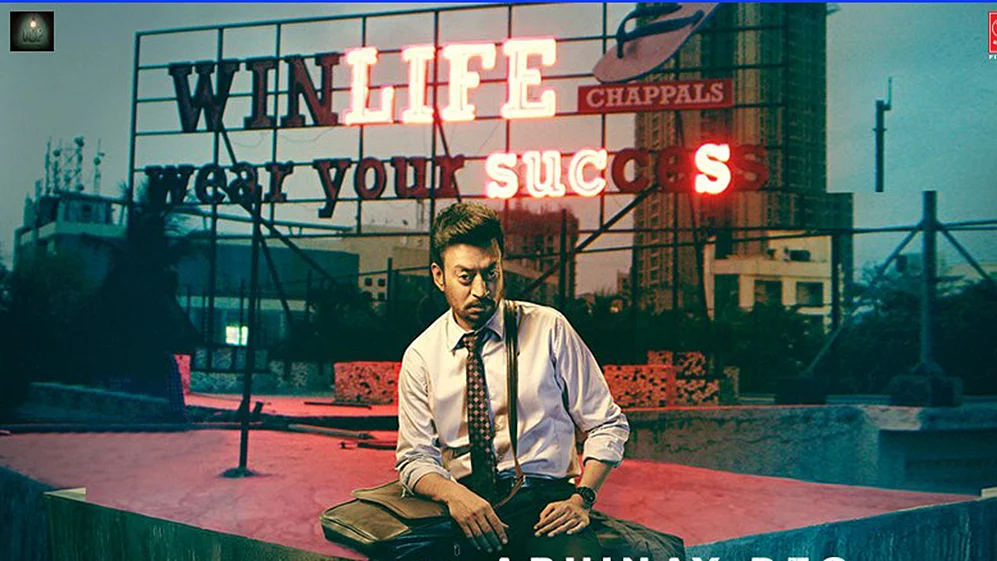Blackmail: Predictable flaws, unpredictable ending but a good watch
Black comedy is not a genre much appreciated in Hindi cinema, but Blackmail is a perfect blend of sensibilities of the Hindi belt, comedy and the starkness of human relations

It is almost always a pleasure to watch Irrfan perform, but Blackmail is a film which belongs to the script writer (Parveez Sheikh) and dialogue writer (Pradhuman Singh Mall). Irrfan’s subtle performance brings out the nuances in the story.
Black comedy is not a genre much appreciated in Hindi cinema, though we have had films like Jaane Bhi Do Yaaro, as an iconic political satire, but at the time of its release, it had not done well in the box office. Delhi Belly, though, was well-received at the box office but was criticised for being too crass.
But Blackmail is a perfect blend of sensibilities of Hindi belt, comedy and the starkness of human relations.
A middle-class young man (Dev) wants to impress his new wife, but lusts over the wives of others too. He is heartbroken when he finds out about his wife’s affair. He thinks of a novel way of taking revenge—by blackmailing the wife’s boyfriend. And that triggers a series of situations which are comic, ironic, sad and sardonic, all at the same time.
Omi Vaidya, of the Three Idiots fame, has made an appearance in the film and has done justice to his role as the self-obsessed-America-returned owner of a toilet-paper selling company, DK (remember ‘bhaag DK Bose bhaag’ song from Delhi Belly?). The film has more than one references to the director Abhinay Deo’s previous Delhi Belly. It also has similar strands where it points out that the simply-defined human relations are not so simple.
Arunoday Singh, as the stupid, muscular boyfriend (Ranjit) of the protagonist’s wife is good, but he is wasted as he has a strong screen presence and would do much better in intense and intricate roles. The protagonist’s colleague, Prabha, the serious and sincere-looking ‘virgin’, but in reality a vamp, played by Anuja Sathe, shines in her character. The way she immediately changes tone from that of an English-speaking sincere worker to a street-smart Marathi-speaking mulgi is amazing.
Once the story unfolds, we see that almost every character in the film is ready to blackmail the other. The movie carries a strong influence of films by Coen Brothers, though this kind of comedy circling over amorality, infidelity and impromptu situations is not common in Hindi cinema.
Urmila Matondkar’s item song and Divya Dutta as the alcoholic wife of Ranjit, always keeping a tap over her wayward philanderer of a husband is praise worthy too. Both these ladies, I feel, remain under-utilised as actors. Urmila, even with her very brief dance sequence, can still give competition to many of the dancing damsels of today.
For a film that is centred around the Dev’s wife’s infidelities, her character has been the least detailed of them all. The weakest link. She simply remains the woman, who married a person she did not want to marry but had to. No shades of grey there.
The pace of the film slows down at times and Amit Trivedi’s music has become monotonous —a chore to the ear. The lyrics of Abhinay Deo’s films carry double meaning and have crude phrases such as ‘de de’ ‘le le’ ‘phat gayi’. Listening to such lyrics one wonders what’s happened to lyricists of the industry, which used to once have wonderful poets like Sahir, Majrooh and Kaifi Azmi. Can the film director bring out dark humour only by using such offending language?
The strongest point of the film was its unpredictability and the weakest its lyrics and treatment of women, which seems to be misogynistic, in the least. But all said and done, film is enjoyable
Follow us on: Facebook, Twitter, Google News, Instagram
Join our official telegram channel (@nationalherald) and stay updated with the latest headlines
